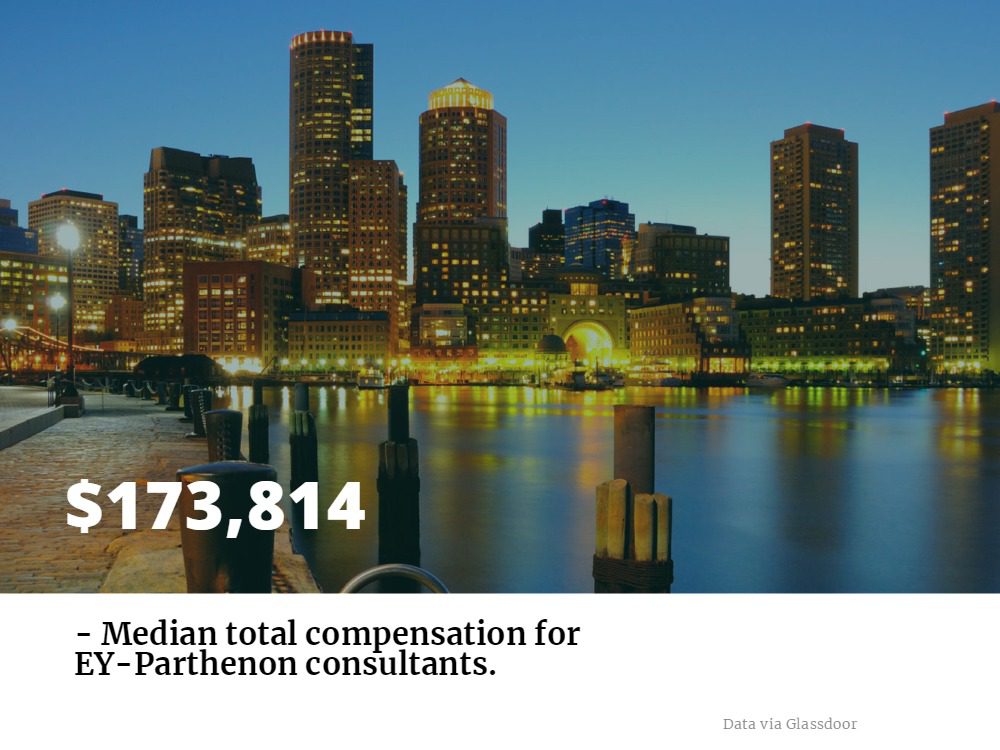The Not-So-Secret Way To Land a Job at EY-Parthenon

After the hard work and sweat of earning an MBA degree, you’ve probably thrown yourself into searching for the perfect job to match your new found expertise. Luckily, some of the world’s top companies are also looking for you.
Companies like EY-Parthenon are always looking to recruit top MBA talent seeking careers in strategy consulting. A division of Boston-based EY (formerly Ernst & Young), one of the world’s top professional services firms, EY-Parthenon is a strategy consultancy which aims to combine innovative thinking with clients’ smarts to create actionable strategies that can cause a real impact in today’s business world.
MBAs Love EY-Parthenon
For MBA graduates looking for a career in strategy consulting, there are few places that can provide the unique combination of diverse clients and rewarding entrepreneurial work that EY-Parthenon offers. Comments from Parthenon’s MBA-holding consultants on why they love their job range from the incredible relationships they get to build with clients to the competitive benefits package they receive (including a night at the EY suite at Yankee Stadium).
“There is certainly an attitude in the New York office that we work hard but ensure that we find that balance necessary to enjoy the great benefits of working with wonderful colleagues in the best city in the world,” commented a graduate of NYU’s Stern School of Business and current Senior Consultant at EY-Parthenon.
For Adam, a graduate of the University of Chicago Booth School of Business and current Vice President at the Shanghai office of EY-Parthenon, working at the company has given him the opportunity to use his industry specific expertise to benefit a diverse set of clients.
“[A]t any given time, I may be leading a two-week diligence for a private equity client while also working on an eight-week corporate strategy engagement,” he says. “Having such a variety of engagements while still being able to be focused on very strategic work within a single sector practice is what I think sets EY-Parthenon apart.”
Life at EY Parthenon
As a consultant at EY-Parthenon, MBAs will play a critical leadership role in the company. Serving as the primary contact for clients, MBA graduates will have the chance to get their hands dirty right away, developing and executing work plans for a diverse client set. Consultants will use their knowledge of teamwork, leadership, analytics and communications to excel in the role.
The consultant career track at EY-Parthenon consists of various phases, beginning with work stream leadership—a focus on gaining the crucial analytical skills needed to best help clients—and ending with client management, the final stage before moving into a role as a partner or managing director. EY-Parthenon accelerates individuals through their careers and have no official timetable for new consultants outside of their own ambition and ability to take on responsibilities.
According to anonymous profiles on Glassdoor, consultants at EY-Parthenon make an average of $173,814 annually.

Landing The Job
Anyone can apply for a consultant role at EY-Parthenon, but the company also actively recruits at a number of undergraduate and graduate business schools. The MBA programs the company recruits from are spread throughout the world, and include some of the United States’ top programs, such as Harvard Business School, Kellogg School of Management, and the Stanford Graduate School of Business. The company also heavily recruits at international schools like INSEAD and the London Business School.
MBA students in their second year may apply directly for a full-time consultant role with the company, and first year students are eligible to apply for the summer consultant position. Any student attending a school that EY-Parthenon directly recruits from should check for the specific instructions on how to apply to these roles, typically through their university’s career services. The interview process for these schools typically takes place over two rounds, with the first round taking place on campus and second round interviews at the one of the various global Parthenon offices.
For more information on the company and job opportunities for current MBA students and graduates, check out the official EY-Parthenon MBA job page.
Just How Much Are Stanford MBA Grads Getting Paid?

Wondering what kind of pay day you can expect if you are among the select 6 percent of applicants who gain admission to Stanford Graduate School of Business (GSB)? Are you sitting down? Perhaps you should be, because the school’s 2017 employment report—released today—reveals record-breaking salaries for the third year in a row.
On average, last year’s graduates, now in their first year of post-MBA work, are pulling down an annual base salary of $144,455—a $4,000 increase over last year’s all-time high (median base compensation was $140,000, also besting last year’s by about $4,000). But it doesn’t stop there. Average signing bonuses, reported by 51 percent of the class, are also up—setting a new record at $29,534. (Median salary bonuses remained unchanged at $25,000.) And as if that weren’t enough, another quarter of the class reported other guaranteed compensation (OGC) surpassing last year’s all-time highs by a whopping $10,000. Average OGC for 2017 grads was $83,065, and median OCG was $50,000. The range was $6,750 to $450,000.
The GSB, in announcing these most recent employment statistics, pointed out that OGC will no longer be tracked by the MBA Career Services and Employer Alliance (CSEA) and that it began last year capturing an “Expected Performance Bonus” metric in its place. This measure includes both guaranteed and non-guaranteed cash compensation based on performance. Though the average and median EPB for the Class of 2017, at $71,946 and $35,000, were each lower than OGC figures, a full 65 percent of the class expected to receive such performance-based compensation, up from 61 percent last year—and substantially higher than the quarter of grads who reported OGC. The reported range for EPB was $5,000 to $450,000.
Stanford MBAs claim higher pay days than graduates of any other school, in part thanks to higher base compensation. Stanford’s median base—$140,000—surpassed that of Harvard Business School (HBS) ($135,000), the University of Pennsylvania’s Wharton School ($130,000), and the University of Chicago Booth School of Business ($125,000). Grads from both Stanford and HBS reported the same median starting bonus of $25,000, but the $50,000 in other guaranteed compensation reported by Stanford grads was double what grads at the school’s top East Coast rival reported.
Tech Less of a Draw Than in Prior Years
Bucking the trend at many other business schools—where increasing percentages of students are clamoring to enter the technology industry—fewer Stanford MBA Class of 2017 grads headed into tech. In what the school deemed “a rebalancing of the scales among the three top industries,” interest in technology dropped 8 percentage points—to a mere 25 percent of the class. Almost a third of the class—32 percent—headed into finance, up a point over last year. Consulting, too, gained four percentage points to attract 20 percent of the most recent class.
“Our leading employers span a wide variety of industries,” Maeve Richard, assistant dean and director of the Career Management Center, said as part of a news story announcing the latest employment statistics on the Stanford GSB site. “They represent organizations in such areas as consulting, finance, technology, consumer products, healthcare, and nonprofits. What they do have in common is work environments that offer the ability to make an impact with a focus on agency, career development, diverse challenges, and responsibilities.”
Indeed, a record-setting 411 organizations hired Stanford MBA students and graduates for internships or full-time roles this past year—up 7 percent over last year and 34 percent from six years ago. A whopping 95 percent of employers hired just one or two students—an indication of the breadth both of GSB employers and student interest.
Uptick in Women Headed into Private Equity and Venture Capital
“In addition, we observed that the number of women going to private equity and venture capital has nearly doubled since 2014,” Richard said as part of the Stanford GSB article. “While we do not disclose fine-grain gender detail and the numbers are still small, we see a definite widening of the cracks in the glass ceiling.”
It’s no wonder that Stanford GSB women would increasingly be looking to break into PE and VC, since those fields yield some of the very highest pay days. The highest reported base salary for the Class of 2017—$285,000—went to a graduate headed into venture capital. Median base salaries for both PE and VC were $175,000, $40,000 higher than for the class as a whole. And it was a graduate headed into a private equity analyst role who reported the mind-boggling $450,000 in other guaranteed compensation. The median signing bonus for PE—at $50,000—was also the highest in the class (on par with investment banking). Though it was a graduate headed into a marketing role who claimed the highest signing bonus of the class, $77,000.
Timing and Location of Offers
Stanford GSB reports full-time offer and acceptance rates at graduation and three months out from graduation—as mandated by CSEA standards. But in past years—as this year—the school has made a point of underscoring the fact that its graduates’ confidence in their ability to find the perfect job sometimes means they hold out longer in accepting their ultimate position than graduates from some other schools. That said, 92 percent of the Class of 2017 had offers three months out from graduation—up two points over last year—and 88 percent had accepted offers, a five-point increase year over year.
In terms of where geographically the most recent Stanford MBA grads wound up, the West was the winner—with 62 percent of grads choosing to remain in the region. This represents a 3 percent decline compared to last year. “Counter to assumptions, only 35 percent of these West region jobs relate to technology,” the school notes. “Finance represented 26 percent, and consulting represented 15 percent.” The Northeastern United States drew the second-most Stanford grads, 16 percent of the class. Another 11 percent took international jobs.
Also of note, 16 percent of the class launched their own startups upon graduation, up one percentage point over last year. Leading industries for these entrepreneurial students include software (15 percent), finance (11 percent), healthcare (9 percent), real estate (9 percent), and internet services (9 percent).
More Grads Seek Socially Responsible Roles
Another notable shift in these most recent employment statistics is the increasing number of Stanford MBA grads heading into careers in socially responsible roles or organizations. Thirteen percent of this year’s graduates answered yes to the question, “Have you chosen a socially responsible role in a private business?” That’s up from just 8 percent last year, when the question was first introduced.
Watch this space for an upcoming piece that will highlight several Stanford students who chose internships focused on social impact this past summer—a Clear Admit exclusive.
This article has been edited and republished with permissions from our sister site, Clear Admit.
Round 1 Decision Week is Here: Harvard, Northwestern Invites Arriving Soon

At 12 p.m. EST, Harvard Business School will unveil its round 1 MBA decision invites, leading a busy week for U.S. schools.
Tomorrow, Wednesday, December 13, will feature the first round of invites for Northwestern University’s Kellogg School of Management, with the Stanford Graduate School of Business, Berkeley Haas, and The Wharton School at the University of Pennsylvania following on Thursday, December 14. And on Friday, December 15, Rice Jones, UCLA Anderson and UMD Smith will reveal their first round invites.
A handful of notable Clear Admit favorites, such as the CMU Tepper full-time MBA, Dartmouth’s Tuck School of Business, Michigan Ross, and Washington Olin, among others, will also be releasing their own first round of MBA invites.
Clear Admit offers a host of valuable tools and advice for those waiting on the edge of their seats, including MBA LiveWire, DecisionWire, and ApplyWire.
Stay up to date with MetroMBA and Clear Admit for more information on the world’s best business schools and upcoming invites.
Columbia Business School Announces New M.S. in Business Analytics Degree

Columbia Business School (CBS), together with Columbia Engineering, yesterday announced a new full-time Master of Science in Business Analytics degree. Distinct from CBS’s MBA degree, the new program features a three-semester curriculum and is really geared toward students who want to learn the modeling techniques and data science tools that help businesses use data to influence decision making. A unique capstone project will serve as a key element of the new program, through which students will work with actual clients and relevant data sets to put the skills they’ve learned to work helping solve those companies’ real-world business problems. The capstone course will extend over the full three semesters of the program.
The program was developed jointly by faculty at both CBS and Columbia Engineering, and the resulting curriculum is designed to prepare graduates to excel in careers both as consulting analysts and associates and as business analysts and data scientists in fields including financial and professional services, technology, advertising and media, and other professions that require both a deep understanding and practical application of data analytics.
“By tapping into the vibrant and diverse business ecosystem that can only be found in New York, Columbia Business School and Columbia Engineering are uniquely situated to offer this new Master’s degree,” CBS Dean Glenn Hubbard said in a statement. “We see this as a must-do program for any future business person who wants to have a leg up in using data to make informed business decisions.”
CBS Enters an Already Crowded Field
Columbia is far from the first to announce a new data analytics master’s program—and it likely won’t be the last. It joins a long and growing list of other leading business schools that have sensed demand from both students and recruiters for programs that marry some of the skill sets of the MBA with the deeper study of data science and analytics that engineering faculty can provide.
MIT Sloan School of Management last year launched its own Master of Business Analytics (MBAn) degree, with leadership and support from the MIT Operations Research Center. In just one year, applications to the program have more than doubled—from 300 to 800—making the degree the most competitive at the school, with an admissions rate of less than 4 percent, the school reports. And just last month Sloan unveiled a new Business Analytics Certificate program that will be open to students in all MIT masters-level programs who want more rigorous academic content focused on data science.
Not to be left out, last month the University of Virginia’s Darden School of Business announced the launch of a new MBA+MSDS dual-degree program, which grants a Master of Data Science degree from UVA’s Data Science Institute and an MBA from Darden in 24 months (tuition for the MBA+MSDA program is the sum of each individual program’s standalone tuition). The program welcomed a pilot cohort this past summer, and Darden is currently accepting applications for the full program, which will launch in 2018.
NYU Stern, for its part, is now accepting applications for the inaugural class of a new specialized one-year Tech MBA, first announced last spring. And just yesterday Stern shared that an $8 million alumni gift will fund creation of a new center for technology, business, and innovation.
YOU MIGHT ALSO LIKE: More Business Schools Training MBA Students for Careers in Tech
Harvard Business School (HBS), too, sees where the action’s at and doesn’t intend to sit idly on the sidelines. In August 2017—together with the Harvard John A. Paulson School of Engineering and Applied Sciences and the Faculty of Arts and Sciences—HBS announced a partnership with 2U, Inc. to deliver a new online certificate program in business analytics. Expected to welcome its first cohort of students in March 2018, the Harvard Business Analytics Certificate Program is designed to help business leaders—including MBA grads—keep up with and leverage the explosion of data now available in every industry.
Some Schools Were Out in Front
Of course, amid this recent flurry of activity to enhance academic offerings at the intersection of technology and business, some schools can claim clear first-mover advantage. MBA students at CMU’s Tepper School of Business can opt to pursue a Technology Leadership MBA Track, a joint partnership between the Tepper School and Carnegie Mellon’s top-ranked School of Computer Science—indeed, it is one of the most popular offerings in the MBA program. Tepper also offers a three-year, dual-degree MBA/Master of Software Engineering program, also in partnership with the School of Computer Science.
And Stanford Graduate School of Business has for several years offered its students the opportunity to pursue a dual degree of significant relevance to students interested in careers in tech. Its joint MA in Computer Science/MBA degree links two of the university’s world-class programs and helps students develop a unique skill set ideal for becoming a manager and/or entrepreneur for new technology ventures. Stanford’s program includes a year of courses at each the GSB and in the Computer Science department followed by a third year of elective courses in both programs, enabling students to shave off one to two semesters it would take to complete both degrees separately.
RELATED: Best Business Schools to Jumpstart Your Career in Tech—Or Advance It
It Only Makes Sense
Whether beginning several years ago or just getting off the ground now, that business schools are recognizing and responding to market demand for business fundamentals married with data science know-how makes complete sense.
“The role of analytics has grown increasingly critical for most sectors of the economy,” Columbia Engineering Dean Mary C. Boyce said in a press release. “Our partnership with Columbia Business School combines our strength in data science, optimization, stochastic modeling, and analytics with their strength in data-driven decision-making for business and marketing to create a rigorous new master’s degree program.”
What Sets Columbia’s New Program Apart?
So what sets the newest program announced yesterday by Columbia apart from others in a crowded field? One distinguishing feature of the M.S. in Business Analytics is the capstone project that will put students to work on real-life consulting projects with companies using the companies’ own data, the school argues. “By working on real-world consulting projects, with real-world data, students will use the modeling techniques and data science tools to provide pragmatic solutions to the practical problems that businesses are facing today,” Costis Maglaras, professor and chair of CBS’s Decision, Risk & Operations Division, said in a press release.
Students in the new Columbia Business analytics degree program will also have valuable access to dedicated career placement services, the school notes, starting with completing a required Professional Development and Leadership course. “The M.S. in Business Analytics combines classroom instruction by distinguished Columbia professors with the experience of working on real-world problems via the capstone project course,” Columbia Engineering Professor Garud Iyengar said in the press release. “We expect this program to have 100 percent placement of its graduates as do our very successful M.S. in Management Science and Engineering and M.S. in Financial Engineering programs.”
Applications are currently being accepted for the first cohort of this new M.S. in Business Analytics. Students can choose to complete the program in one year by taking a summer semester or can take three non-contiguous semesters (fall, spring, fall), which would reserve the possibility of a summer internship.
For more information about the new Columbia M.S. in Business Analytics, click here.
This article has been edited and republished with permissions from our sister site, Clear Admit.
Hiring Practices Examined in New UMD Smith Research

Did you know that about half of job openings go to friends and acquaintances of high-powered individuals within an organization? We’ve always been told it’s about who you know, not what you know, after all.
Yes, referral-based hiring come across as a little sketchy, but many human resource departments actually encourage the strategy. But despite that, a research paper co-written by two Robert H. Smith School of Business scholars shows that hiring managers invite harsh moral judgments when they give jobs to friends and acquaintances referred to them.
Entitled “Compromised Ethics in Hiring Processes? How Referrers’ Power Affects Employees’ Reactions to Referral Practices,” the author’s note; “When the referrer is powerful, observers will believe the hiring manager is attempting to increase the referrer’s dependence on him/her, ultimately resulting in future benefits for the hiring manager.”
The research was authored by UMD Smith professor Rellie Derfler-Rozin, Ph.D. candidate Bradford Baker, and Harvard Business School professor Francesca Gino and published in the Academy of Management Journal. They found that hiring managers appear self-serving and unethical to others in the organization, which can disrupt workplace chemistry and even hurt support for the new hire.
“Referral practices can be seen as morally murky territory in which special interests and the exchange of favors dominate, above and beyond merit,” the authors wrote.
However, they also found that referral-based hiring practices have advantages: Not only do referrers usually have inside information about the applicants they recommend, but they also have incentives to train, mentor, and monitor them as well. Additionally, new hires want to perform well so they don’t embarrass the referrers who put trust in them.
Ultimately, the research does not suggest that companies should stop referral-based hiring, but that hiring managers and the people who give referrals should be mindful of the power dynamics involved.
“One suggestion could be creating a system in which referrers are anonymous, at least for an initial period of time pre and post-hire, while simultaneously providing enhanced transparency regarding the reasons for the referral,” the authors write.
You can read the entire research paper “Compromised Ethics in Hiring Processes? How Referrers’ Power Affects Employees’ Reactions to Referral Practices” here.
Harvard Business School Research Offers New Spin on “Time Is Money” Axiom

Money can buy happiness, according to recent research from the Harvard Business School. But, it primarily has to be spent on making time.
Ashley Whillans, an Assistant Professor of Business Administration at HBS, published research on the “impact of buying one’s way out of negative experiences,” whether that means find ways to reduce a commute or taking a vacation. She points to “time stress”—or the tension that arises when time becomes a scarce resource—as a critical source of unhappiness, especially for many wealthy individuals. She explains:
“People have been trying to find ways to use their discretionary income to maximize their quality of life for a long time. We were really interested in seeing if buying ourselves out of negative experiences might be another pathway to happiness that had been relatively unexplored.”
For the purposes of their research, Whillans and her team define happiness as both overall and moment-to-moment satisfaction.
Whillans surveyed American, Canadian, Danish, and Dutch citizens across the socioeconomic spectrum about their feelings after they made a time-saving purchase. All participants generally reported positive feelings after ordering take-out food, for instance, but Whillans found that when they made these purchases too often, consumers developed a type of “hedonic adaptation” where they used the extra time to do something pleasurable rather than productive.
The role of gender in the time/money/happiness equation is notable, particularly when it comes to the post-work childcare and housekeeping “second shift” many American and Canadian women have to pull. The result is that women “have more educational opportunities than before, and [are] likely to be making more money and holding high-powered jobs but their happiness is not increasing commensurately.”
In ongoing research Whillans is pursuing with Michael Norton, a Harold M. Brierley Professor of Business Administration, into the influence that time-saving purchases have on relationship satisfaction, she explains that “both men and women feel less pulled between the demands of work and home life, and that positively impacts the relationship.”
Whillans’ research offers tangible proof that outsourcing specific tasks throughout the week is a fiscally responsible way to relieve stress.
Check out the rest of Harvard Magazine’s story on the research here.
